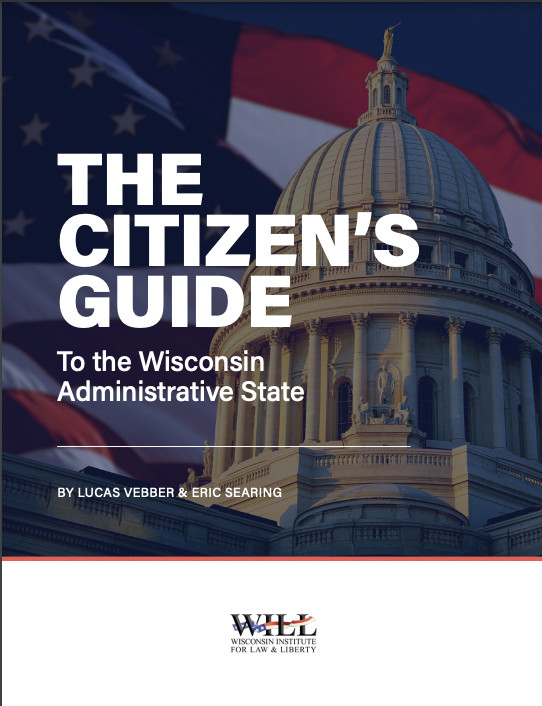The separation of powers is fundamental to American government. We all learn that the U.S Constitution divides power in our system: the legislative branch writes laws, the executive branch enforces laws, and the judicial branch interprets laws. What we often ignore is the way the executive branch has also been empowered to write and interpret law through state and federal agencies – sometimes called the administrative state. Agency bureaucrats get to make decisions that impact all of our lives despite never being elected and facing little accountability to the people they regulate.
The Citizen’s Guide to the Wisconsin Administrative State, by WILL Deputy Counsel, Lucas Vebber, and Director of External Relations, Eric Searing, provides an overview of the constitutional and statutory underpinnings of the administrative state, an overview of the rulemaking process, how the Legislature and the public at large are empowered to hold agencies accountable to the law, and what to do if an agency does not play by the rules.
- What is a rule? A “rule” is “a regulation, standard, statement of policy, or general order of general application that has the force of law and that is issued by an agency to implement, interpret, or make specific legislation enforced or administered by the agency or to govern the organization or procedure of the agency.”
- Typical permanent rulemaking can take a year or longer to complete the promulgation process in some cases. An emergency rule can be promulgated in as little as 11 days.
- The critical role of legislative oversight. The lawmaking powers being exercised by agencies during rulemaking are inherently legislative powers that have been delegated to those agencies. Wisconsin’s Supreme Court has stated for such a delegation to be constitutional, the Legislature must maintain oversight and control of agencies when they engage in rulemaking. The Legislature has some important powers when it comes to rules. These powers are often exercised by the Joint Committee for Review of Administrative Rules (“JCRAR”).
- Opportunities for citizen engagement. A great opportunity to be heard is by showing up to hearings, submitting comments, or both. Agencies must read and respond to your comments. Your state representatives can also ask state agencies to take a closer look if you or a business are running up against a regulation.


The Citizen's Guide to Wisconsin's Administrative State
The Citizen’s Guide to the Wisconsin Administrative State, by WILL Deputy Counsel, Lucas Vebber, and Director of External Relations, Eric Searing, provides an overview of the constitutional and statutory underpinnings of the administrative state, an overview of the rulemaking process, how the Legislature and the public at large are empowered to hold agencies accountable to the law, and what to do if an agency does not play by the rules.
